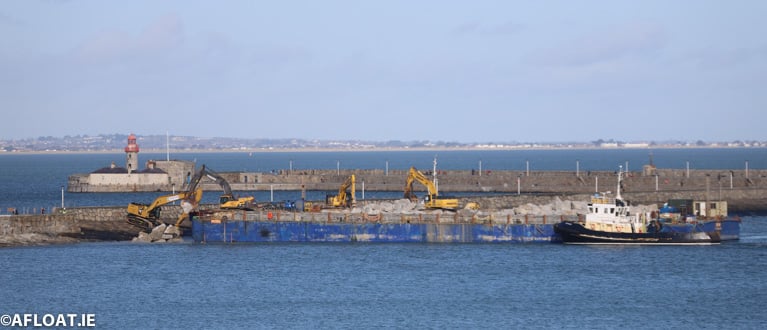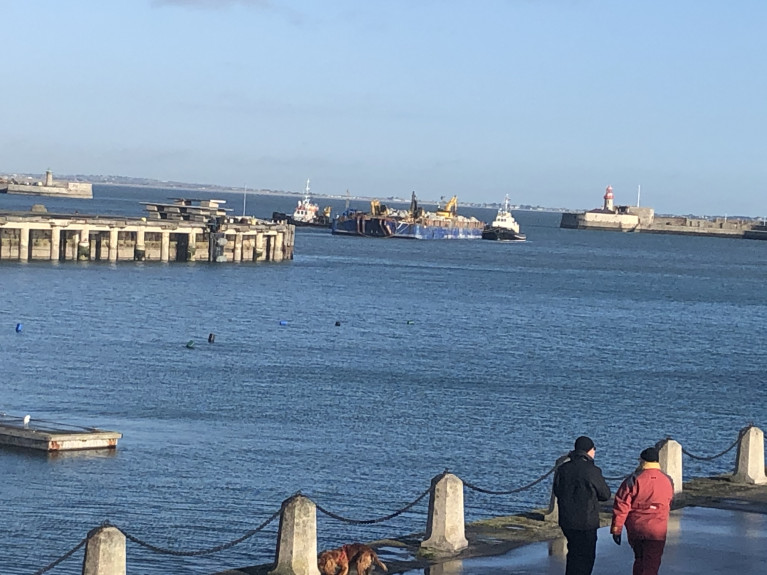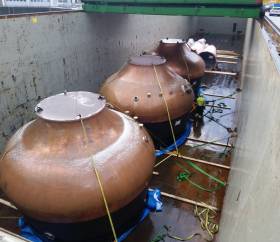Displaying items by tag: Storms
Storms Past and Present Influence Repair Works in Dun Laoghaire Harbour
Works have recently begun to repair damage in Dun Laoghaire Harbour caused by a storm from almost two years ago, however further bad weather looms as Storm Dennis is to sweep in this weekend, writes Jehan Ashmore.
As Afloat reported in November, a landing-craft vessel in the harbour assisted a contractor which Dun Laoghaire-Rathdown County Council tasked to repair damage notably at the East Pier following Storm Emma in March 2018. Due to access issues, diggers were transported by sea to land ashore on both the seaward sides of the West and East Piers.
Ironically Storm Ciara made its presence felt in regards to repair works required at the East Pier. As Afloat also reported, a section of the pier's revetments removed by Storm Emma were due to receive replenished rock armour. This work was expected to be completed by Christmas, however, it was only last week that a tug towing a barge laden with 1,700 tonnes of Cornish granite arrived at the harbour.
As the weather abated, the tug Vanguard which made the delivery voyage, was joined in the harbour on Wednesday by Wicklow based tug, AMS Retriever to assist in the short-distance towing operation. The tugs departed St. Michael's Pier along with the barge that was positioned in Scotman's Bay in close proximity off the East Pier.
 The Vanguard with accompanying tugs offloads its rock cargo at the back of Dun Laoghaire's East Pier Photo: Afloat
The Vanguard with accompanying tugs offloads its rock cargo at the back of Dun Laoghaire's East Pier Photo: Afloat
According to DLRCoCo, the works at the East Pier are scheduled to be completed by the end of February.
On a related note to the weather in the harbour, Storm Ciara led to three Belgium registered trawlers forced to take refuge by sheltering within the harbour.
The trio of beam-trawlers berthed alongside Carlisle Pier involved Avatar (Z-333) and rafted alongside Francine (Z 90). While the third trawler, De Marie Louise (Z 47) berthed ahead but nearer to the pierhead.
As weather conditions improved, the trawlers departed back into the Irish Sea.
#WhiskeyPlant - A cargoship in Scotland was delayed in loading distillery tanks bound for an Irish whiskey plant due to recent storms hitting the UK coast, writes Jehan Ashmore.
The 81m short-sea trader Scot Explorer (1996/2,521dwt) was stuck in Buckie Harbour. The port in north-east Scotland on the Moray Firth, east of Inverness, is from where Scotline made its first shipment in 1979 bringing logs to Germany, before relocating to a port in Sweden.
According to the shipping company the extremely rough weather prevented Scot Explorer in loading whiskey distillery tanks, even in the shelter of the harbour. The project cargo was bound for Jameson's Old Distillery plant in Midleton, Co, Cork.
Last month Afloat reported on Scotline’s latest ship acquisition of the 90m Odertal, which was renamed Scot Leader which has a 4,507dwt.
The newcomer joins the Romford, England based fleet which specialise in the transportation of sawn timber products. This involves a network of liner services linking the UK, Ireland, Scandinavia and Germany.

























































